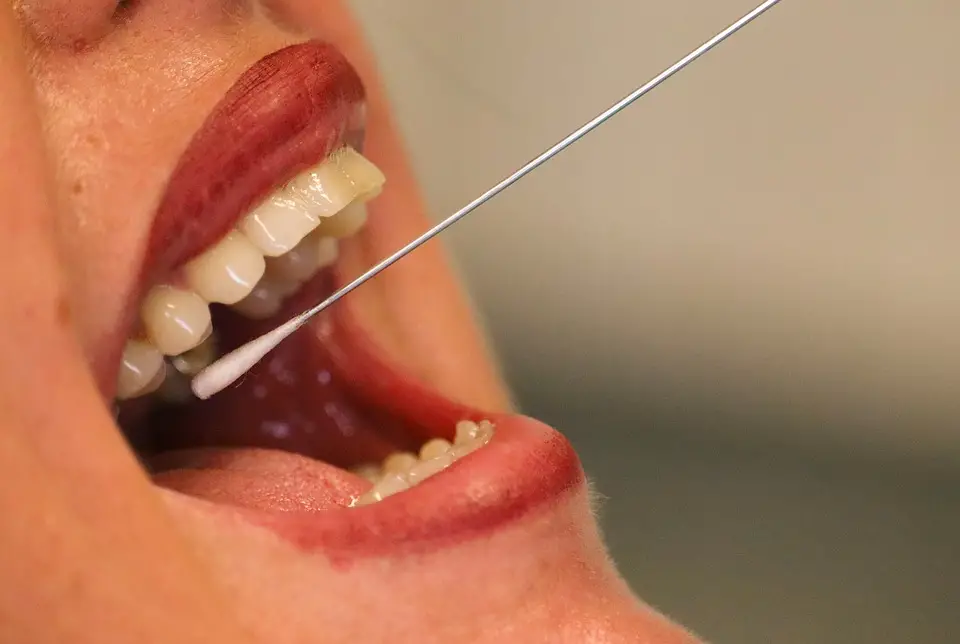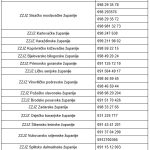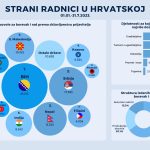As Poslovni Dnevnik writes, while in Rijeka people come for Croatian covid tests and get their results more or less within 24 hours, in the City of Zagreb, Split and other larger cities, even when a person has symptoms of coronavirus infection, they’re often waiting for a week to get in line for testing. As such, many symptomatic people end up coming out of self-isolation before a positive PCR test result confirming their active infection even arrives.
The problem with Croatian covid tests has been going on for months now, and over the last few weeks, under pressure from a growing number of coronavirus patients and symptomatic sufferers, it has become rather unsustainable.
What’s the reason for such a long wait to get your hands on Croatian covid tests?
As they say for Novi list from the Croatian National Institute of Public Health, the high vaccination rate could be the reason for the better overall situation in Rijeka, meaning there is less of a rush to get tested because a higher percentage of people already have valid covid certificates, so they don’t need to be tested for the virus to such an extent.
“There is crowding for tests due to the large number of new patients and their contacts. Obviously, these new patients have a lot of close contacts, and there are a lot of people who haven’t been vaccinated, so if they have to go to public institutions, they need a valid COVID certificate, which they can get based on a negative PCR or RAT result. Numerous travellers also come to get tested. Three weeks ago, Italy introduced new rules that a negative PCR test result is required to enter the country, and some ski resorts also require it,” explained Dijana Mayer, an epidemiologist at the CNIPH.
Most of the people needing tests aren’t vaccinated, so they simply have to come for testing if they want to go pretty much anywhere, and there are also new variants that affect people who have already been vaccinated, but for various reasons they still have to be tested.
Crowds of would-be and returning skiers
Among those waiting in lines for Croatian covid tests, she added, are people who live here in Croatia who have returned from a foreign ski resort, and due to respiratory symptoms, coughs and runny noses, they now have to be tested.
“I don’t expect this trend to last for very long, but the issues surrounding Croatian covid tests could last for another two to three weeks. With the introduction of rapid antigen tests in primary care, this could go faster than it is now,” assured Mayer, explaining that there is a very good situation in Primorje-Gorski Kotar County, where there aren’t waits for days like there currently is in Zagreb, which has a high vaccination rate.
“Primorje-Gorski Kotar County is very well vaccinated. In Split-Dalmatia County, where not that many people have been vaccinated, the situation with covid testing is even worse, because the people of Split are sent for testing to Makarska, Sinj or Trogir. Such a situation directly correlates with vaccination,” noted Mayer.
Primorje-Gorski Kotar County doesn’t have a waiting list for testing, whether it is PCR tests or rapid antigen tests, which have recently earned the same status when issuing COVID certificates.
“We’ve organised ourselves for these special circumstances in which certain organisational adjustments need to be made. Our cooperation with GPs is very good and all of those who receive referrals, whether it’s for a rapid antigen test or for PCR testing, receive the results either on the same day or on the next day. Such an approach is our main task and we’ll continue to work like this, and if necessary, we’ll once again extend our working hours to 18:00, as we did last week at our test point in Mlaka, but now, due to less interest, we’ve returned to working until 13:00. We also occasionally notice fatigue in people who work doing these jobs, and we’re part of a system that has a high exposure to infection, but we’re continuing to work on the prevention of COVID-19,” explained Prof. Dr. Vladimir Micovic in conversation with Novi list.
According to him, one of the key goals of timely coronavirus testing is to put patients into self-isolation and start treatment in time for when any symptoms of the disease appear, and thus ultimately reduce the pressure on the hospital system. The waiting lists for Croatian covid tests, while the most contagious Omicron variant of the coronavirus is spreading like wildfire across most of the world at the moment, are actually completely absurd.
In Pimorje-Gorski Kotar County, except at the main test point in Rijeka’s Mlaka, people can be tested in all branches of the institute, and when it comes to rapid antigen testing, many private institutions, such as pharmacies and private health institutions, introduced this option back in autumn 2021.
“Rapid antigen tests have their value in proving the presence of the disease, but PCR testing is the gold standard, the final confirmation of the presence of the disease and, after all, the condition that European Union countries require for an EU COVID certificate to be valid,” concluded Micovic.
For all you need to know about coronavirus specific to Croatia, make sure to bookmark our dedicated section and select your preferred language if it isn’t English.











